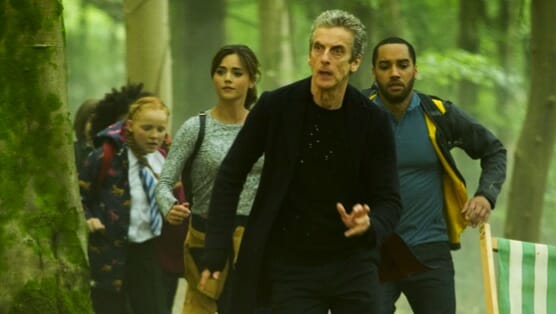Doctor Who: “In the Forest of the Night”
(Episode 8.10)

Well, that was a bit disappointing.
Of course, I suppose—given the consistent stream of quality installments we’ve seen from Doctor Who in recent months—that a lapse was bound to happen sooner or later. It’s just a shame that it not only has to happen this late in the season, but from the likes of a writer as notable as Frank Cottrell Boyce.
To clarify, Boyce’s contribution fulfills the annual “guest star” writer slot that has been a staple of the Moffat era. In Moffat’s first year as showrunner, Notting Hill/Love Actually writer Richard Curtis offered up the emotional “Vincent and the Doctor”; for the past two years, the spot has gone to Neil Gaiman with the extraordinary “The Doctor’s Wife,” followed by the somewhat less extraordinary “Nightmare in Silver.” Boyce certainly sounds like an exciting prospect on paper. Among film fans, he is perhaps best known for his collaboration with director Michael Winterbottom— a partnership that resulted in such post-modern British classics as 24 Hour Party People and A Cock and Bull Story. Aside from his more adult fare, Boyce has also won accolades for his children’s book, the most well-known being Millions, which was adapted into a film by Danny Boyle.
Boyce’s indisputable creativity as a writer combined with his understanding of how to tell a great children’s story would seem to suggest the makings of a memorable Who adventure. Instead, what emerges is a woefully generic hour with the kind of ham-fisted environmental message guaranteed to instigate eye rolls from all who watch it.
The episode opens in what appears to be a vast forest with a young girl named Maebh running up to the TARDIS. She tells The Doctor that she has been told to find him by Clara. The Doctor quickly realizes that, far from landing in a distant forest, he’s landed right in the heart of London. Reports soon come in from all over, claiming that massive forests have suddenly appeared in major cities across the globe.
Meanwhile, Clara and Danny—having just awakened from an overnight school trip to a museum—attempt to guide their students through the forest to safety. After meeting up with The Doctor (and encountering wolves and a tiger), the group learns that Maebh is experiencing some sort of connection to nature. What’s more, the voice telling her to find The Doctor was not Clara’s, but that of a higher power. Using the little girl as a mouthpiece, the trees (I guess?) explain that their appearance has to do with an upcoming solar flare. The Doctor, fearing the worst, comes to the conclusion that the trees have communicated with the sun, and are bringing on a solar flare to wipe away the Earth.
-

-

-

-

-

-

-

-

-

-

-

-

-

-

-

-

-

-

-

-

-

-

-

-

-

-

-

-

-

-

-

-

-

-

-

-

-

-

-

-








































